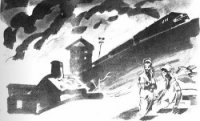Watership Down - Adams Richard George (книги полностью бесплатно .txt) 📗
Vervain advanced slowly across the floor. Even he could derive little satisfaction from the prospect of killing a tharn rabbit half his own size, in obedience to a contemptuous taunt. The small rabbit made no move whatever, either to retreat or to defend himself, but only stared at him from great eyes which, though troubled, were certainly not those of a beaten enemy or a victim. Before his gaze, Vervain stopped in uncertainty and for long moments the two faced each other in the dim light. Then, very quietly and with no trace of fear, the strange rabbit said,
"I am sorry for you with all my heart. But you cannot blame us, for you came to kill us if you could."
"Blame you?" answered Vervain. "Blame you for what?"
"For your death. Believe me, I am sorry for your death."
Vervain in his time had encountered any number of prisoners who, before they died, had cursed or threatened him, not uncommonly with supernatural vengeance, much as Bigwig had cursed Woundwort in the storm. If such things had been liable to have any effect on him, he would not have been head of the Owslafa. Indeed, for almost any utterance that a rabbit in this dreadful situation could find to make, Vervain was unthinkingly ready with one or other of a stock of jeering rejoinders. Now, as he continued to meet the eyes of this unaccountable enemy-the only one he had faced in all the long night's search for bloodshed-horror came upon him and he was filled with a sudden fear of his words, gentle and inexorable as the falling of bitter snow in a land without refuge. The shadowy recesses of the strange burrow seemed full of whispering, malignant ghosts and he recognized the forgotten voices of rabbits done to death months since in the ditches of Efrafa.
"Let me alone!" cried Vervain. "Let me go! Let me go!"
Stumbling and blundering, he found his way to the opened run and dragged himself up it. At the top he came upon Woundwort, listening to one of Groundsel's diggers, who was trembling and white-eyed.
"Oh, sir," said the youngster, "they say there's a great Chief Rabbit bigger than a hare; and a strange animal they heard-"
"Shut up!" said Woundwort. "Follow me, come on."
He came out on the bank, blinking in the sunlight. The rabbits scattered about the grass stared at him in horror, several wondering whether this could really be the General. His nose and one eyelid were gashed and his whole face was masked with blood. As he limped down from the bank his near foreleg trailed and he staggered sideways. He scrambled into the open grass and looked about him.
"Now," said Woundwort, "this is the last thing we have to do, and it won't take long. Down below, there's a kind of wall." He stopped, sensing all around him reluctance and fear. He looked at Ragwort, who looked away. Two other rabbits were edging off through the grass. He called them back.
"What do you think you're doing?" he asked.
"Nothing, sir," replied one. "We only thought that-"
All of a sudden Captain Campion dashed round the corner of the hanger. From the open down beyond came a single, high scream. At the same moment two strange rabbits, running together, leaped the bank into the wood and disappeared down one of the blocked tunnels.
"Run!" cried Campion, stamping. "Run for your lives!"
He raced through them and was gone over the down. Not knowing what he meant or where to run, they turned one way and another. Five bolted down the opened run and a few more into the wood. But almost before they had begun to scatter, into their midst bounded a great black dog, snapping, biting and chasing hither and thither like a fox in a chicken run.
Woundwort alone stood his ground. As the rest fled in all directions he remained where he was, bristling and snarling, bloody-fanged and bloody-clawed. The dog, coming suddenly upon him face to face among the rough tussocks, recoiled a moment, startled and confused. Then it sprang forward; and even as they ran, his Owsla could hear the General's raging, squealing cry, "Come back, you fools! Dogs aren't dangerous! Come back and fight!"
48. Dea ex Machina
When Lucy woke, the room was already light. The curtains were not drawn and the pane of the open casement reflected a gleam of sun which she could lose and find by moving her head on the pillow. A wood pigeon was calling in the elms. But it was some other sound, she knew, that had woken her-a sharp sound, a part of the dream which had drained away, as she woke, like water out of a washbasin. Perhaps the dog had barked. But now everything was quiet and there was only the flash of sun from the windowpane and the sound of the wood pigeon, like the first strokes of a paint brush on a big sheet of paper when you were still not sure how the picture was going to go. The morning was fine. Would there be any mushrooms yet? Was it worth getting up now and going down the field to see? It was still too dry and hot-not good mushroom weather. The mushrooms were like the blackberries-both wanted a drop of rain before they'd be any good. Soon there'd be damp mornings and the big spiders would come in the hedges-the ones with a white cross on their backs. Jane Pocock running off to the back of the schoolbus when she brought one in a matchbox to show Miss Tallant.
Now she couldn't catch the reflection in her eyes any more. The sun had moved. What was going to happen today? Thursday-market day in Newbury. Dad would be going in. Doctor was coming to see Mum. Doctor had funny glasses that pinched on his nose. They'd made a mark each side. If he wasn't in a hurry he'd talk to her. Doctor was a bit funny-like when you didn't know him, but when you did he was nice.
Suddenly there was another sharp sound. It ripped through the still, early morning like something spilled across a clean floor-a squealing-something frightened, something desperate. Lucy jumped out of bed and ran across to the window. Whatever it was, it was only just outside. She leaned well out, with her feet off the floor and the sill pressing breathlessly across her stomach. Tab was down below, right by the kennel. He'd got something: rat it must be, squealing like that.
"Tab!" called Lucy sharply. "Tab! Wha' you got?"
At the sound of her voice the cat looked up for a moment and immediately looked back again at its prey. 'T'weren't no rat, though; 't'was a rabbit, layin' on its side by the kennel. It looked proper bad. Kicking out an' all. Then it squealed again.
Lucy ran down the stairs in her nightdress and opened the door. The gravel made her hobble and she left it and went on up the flower bed. As she reached the kennel the cat looked up and spat at her, keeping one paw pressed down on the rabbit's neck.
"Git out, Tab!" said Lucy. "Crool thing! Let'n alone!"
She cuffed the cat, which tried to scratch her, ears laid flat. She raised her hand again and it growled, ran a few feet and stopped, looking back in sulky rage. Lucy picked up the rabbit. It struggled a moment and then held itself tense in her firm grip.
" 'Old still!" said Lucy. "I ain't goin' 'urtcher!"
She went back to the house, carrying the rabbit.
"What you bin up to, eh?" said her father, boots scratch-scratch over the tiles. "Look at yore feet! En I told you-Wha' got there, then?"




